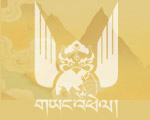 King Jigme Khesar Namgyel Wangchuck is the embodiment of temporal power in Bhutan. He is the central authority, commanding huge respect and possessing an immense presence. When discussed voices deferentially lower; attendance at public gatherings creates hushed excitement; his photograph assumes esteemed prominence in every home. The Druk Gyalpo occupies a special place in the nation's heart. His right to rule is unquestioned - many regard him a god - and he is considered above reproach. Bhutan's Kings have served their country admirably, and given respective contexts each of their rules could be judged noteworthy successes. In this sense a divine right has been borne out through worldly actions. King Jigme Khesar Namgyel Wangchuck is the embodiment of temporal power in Bhutan. He is the central authority, commanding huge respect and possessing an immense presence. When discussed voices deferentially lower; attendance at public gatherings creates hushed excitement; his photograph assumes esteemed prominence in every home. The Druk Gyalpo occupies a special place in the nation's heart. His right to rule is unquestioned - many regard him a god - and he is considered above reproach. Bhutan's Kings have served their country admirably, and given respective contexts each of their rules could be judged noteworthy successes. In this sense a divine right has been borne out through worldly actions.
The origins of a Bhutanese political perspective lie in an intimate relationship with religion. Power is interpreted as divinely endorsed. The legitimacy to rule is therefore embodied within individual agents, rather than determined through rational structures. With power comes responsibility for the national well-being, and the system has retained its coherence by maintaining and promoting this reciprocal paternalistic relationship. The records of successive monarchs reveal success in the implied duties of promoting a stable fostering internal environment and protecting it from external threats. Furthermore, such has been their ability to move with the times whilst placing the national over the personal interest, that labels of "benevolent" or "enlightened" are not inappropriate. How does one interpret preemptory policies that have abolished feudal exploitations, limited the ability of the "elite" to pursue their personal ambitions and even significantly reduced the power of the monarchy itself?
The imperatives of modernization and development have necessitated fundamental ongoing political reforms. In 1953 a National Assembly was established as the first fully representative national forum. Traditional feudal relations were brought to an end with the abolition of serfdom in 1956, soon followed by an extensive series of land reforms. The 1969 Forest Act nationalized all forests, and the 1980 Land Act set a land ceiling of 25 acres (although orchard land is exempted). Such policies have been particularly successful in limiting the abilities of established nobilities to enhance their personal wealth. Since the inception of planned development in the early 1960s state infrastructure has expanded substantially, in keeping with the government's role as principal agent in the development process. State-society relations have now significantly changed in size and scope, and there has been a trend towards increased formalization.
Governance issues in Bhutan essentially comprise of accommodating change within a functioning system. The Kingdom has been blessed with the institution of hereditary monarchy, providing a constant source of wisdom and inspiration, affording a stable and consistent policy environment, ensuring good governance and playing a pivotal role in guiding the nation's development. Good governance is aided by a system of double accountability (to the King and to the National Assembly) and the transparency of a small community. High priority has been given to the promotion of a strong and professional civil service. A new formal political hierarchy has emerged from within the preexisting political culture related to an expanding state.
In 1998, at the insistence of the King, there occurred major reforms in the constitutional setup, including the following important alterations: Ministers are to be elected for a term of 5 years by the National Assembly (previously they were appointed by the King for an indefinite period); the Cabinet of Ministers is vested with full executive powers, where the Chairman of the Cabinet (named as the Prime minister) functions as Head of Government (before the King was Head of Government and Chairman of the Cabinet); the National Assembly can register a vote of no confidence in the King.
The whole social fabric of the nation is undergoing a transformation. Many traditional institutional arrangements are and will increasingly come under threat, and it is crucial that important institutions are either maintained or replaced by alternatives within the modern state infrastructure. A unique system of decentralization has been developed as an ongoing process, based around local institutions and customs, linking the central level to the local level in the decision-making process. Formal institutions were formed at the district and block levels in 1981and 1991 respectively. The eventual aim is to promote a fully participatory approach to decision-making and render the development of the nation an inclusive process.
Bhutan has finally embraced democracy which was gifted from the throne to the people of Bhutan against the wishes of the citizens.
|



